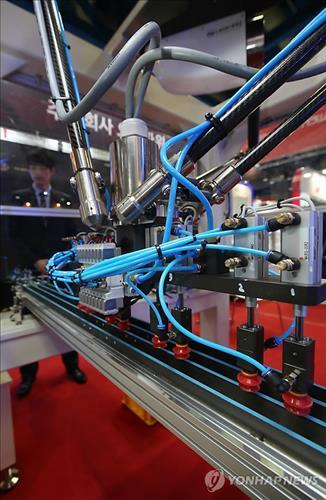- California Assembly OKs highest minimum wage in nation
- S. Korea unveils first graphic cigarette warnings
- US joins with South Korea, Japan in bid to deter North Korea
- LPGA golfer Chun In-gee finally back in action
- S. Korea won’t be top seed in final World Cup qualification round
- US men’s soccer misses 2nd straight Olympics
- US back on track in qualifying with 4-0 win over Guatemala
- High-intensity workout injuries spawn cottage industry
- CDC expands range of Zika mosquitoes into parts of Northeast
- Who knew? ‘The Walking Dead’ is helping families connect
S. Korean gov’t, Samsung to back development of manufacturing robots

A robot on display at the Automation World 2015 exhibition in Seoul on March 18, 2015. (Yonhap file photo)
SEJONG (Yonhap) — South Korea’s government said Monday that it will join forces with Samsung Electronics Co. to develop precision manufacturing robots that could open new horizons for the local manufacturing sector.
The plan calls for 16.75 billion won (US$14.8 million) worth of taxpayers’ money to be invested in the next three years to develop key components that can allow more robotic parts to be made in the country and lower overall prices of industrial machines, the Ministry of Trade, Industry and Energy said.
Developed robots can be used to make small products like mobile phones and consumer electronic products that require a high degree of precision, it said, adding all technology developed will be used to assist small and medium-sized robotics companies.
“Emphasis will be placed on developing precision speed reducers, motors, controllers and sensor encoders that are currently expensive and imported from abroad,” it said. “Development of these parts should be completed by late 2018.”
Robots are widely used to make cars, semiconductors, computer chips and displays, with their use being expanded into areas like plastic, chemicals, food and metal goods.
The global market stood at $10.7 billion last year, with annual growth having reached 22 percent in the past six years. International data predicted growth could reach an average of 18 percent annually up till 2018, with the use of robots in the manufacturing process accounting for 25 percent of the total by 2025, from around 10 percent at present.
In 2014, South Korea had the fourth largest robot market, with China leading the pact. The Northeast Asian market is expected to continue leading the globe in demand and production in the years to come.
The ministry said that Samsung, one of the world’s largest producers of memory chips, mobile phones and consumer electronics, will provide product specification, verify quality, offer consulting and give guidance to robot makers to get their products to market.
If development efforts make headway, mass-produced six-axis vertical articulated robots will reach the market and allow companies to be less reliant on cheap labor to make products, the ministry said.
At present, companies, such as Samsung, have to rely on countries like China to make their products, but a spike in labor costs is affecting their profit margins.
In addition, the joint effort will help companies come up with manufacturing and assembly know-how, the ministry said, adding this kind of support can boost the overall competitiveness of local robotics companies.
“Once affordable robots reach the market and are more widely used, it can lead to the creation of ‘smart factories’ and bring about far-reaching innovations to the manufacturing sector,” the ministry said.













![배우 김민희와 홍상수 감독[스타뉴스]](http://www.koreatimesus.com/wp-content/uploads/2025/04/20250408101705671-120x134.jpg)

